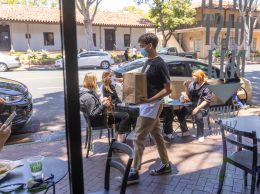In the fifth round of Project Homekey awards, Gov. Gavin Newsom announced the city of San Luis Obispo will get more than $15 million to purchase the Motel 6 in Paso Robles and convert it into a homeless shelter.
The Motel 6 has more than 120 units, and will be converted into an emergency homeless shelter with permanent units attached.
Project Homekey is a state program to buy or lease motels to house the homeless, especially those who are particularly vulnerable to COVID-19. Paso Robles does not currently have a homeless shelter and has a disproportionate number of COVID-19 cases.
“When it comes to homelessness no community is immune, no person is untouched and while the issue is widely thought to affect only our urban centers, the truth is that it occurs in rural areas, small towns and remote parts of our state,” Newsom said in a news release. “Through Homekey, we are making historic investments that will have lasting impacts in our big cities, but also our small towns and tribal communities. These investments are helping thousands of Californians vulnerable to COVID-19 exposure get access to permanent, supportive housing.”
In the previous round, Newsom announced that Ventura County received the funding it was hoping for to buy the Vagabond Inn in Oxnard, which will be used as a homeless shelter during the COVID-19 pandemic before being turned into permanent supportive housing for the homeless population.
Ventura Mayor Matt LaVere was on a virtual conference with the governor and several other mayors when the state announced the fourth round of Project Homekey funding. Ventura County also had another project funded in the second round of awards, on Ventura’s west end, and LaVere praised the program’s effects on both the city and other communities in the county.
“Here in Ventura County, we were able to serve over 400 of our most at-risk homeless individuals. On top of that, we were able to transition 80 of those individuals successfully into permanent housing. It just shows that when there’s this commitment community-wide to do this hard work, you can get the results you need,” LaVere said in the conference. “Homekey is going to help us continue to save lives. We’re going to work with our housing authority and local affordable housing developers to get the projects we need to continue this successful transition from sheltering into permanent housing.”
Project Homekey also reached Santa Barbara County, where it will help convert an office building in Lompoc into permanent homeless housing.
More than $627 million has been directed by the state to 71 projects, creating more than 4,600 units of housing. The state government is working with the Legislature to funnel another $200 million of federal Coronavirus Relief Funds into Project Homekey.
HOUSING CONFERENCE
A conference on Oct. 21 pushed the conversation about the future of housing in Ventura County, especially as it relates to COVID-19.
The 19th Annual Ventura County Housing Conference included student research from CSU Channel Islands about the state of housing demand and supply, inequalities and resiliency in the system and how the pandemic has influenced it. There was also a panel on how to preserve and transform homes in a COVID-19 environment, which was led by Luz Soto of the Cabrillo EDC and Janet Sprissler of Formatic Property Management.
There was time for networking before a second panel, which was focused on Ventura County’s housing future. Even then, the discussion didn’t get too far away from COVID-19, but Nick Deitch of Mainstreet Architects & Planners and Alex Russell of Many Mansions spoke about new strategies in housing design, process, and policy.
The Ventura conference concluded with breakout sessions discussing topics like the availability of skilled labor in the area, the future of zoning and urban design, new homeownership tools, workforce housing , housing the homeless and strategies to improve housing affordability.
• To submit an item for the CRE column, contact Amber Hair at ahair@pacbiztimes.com.






 Print
Print Email
Email

















